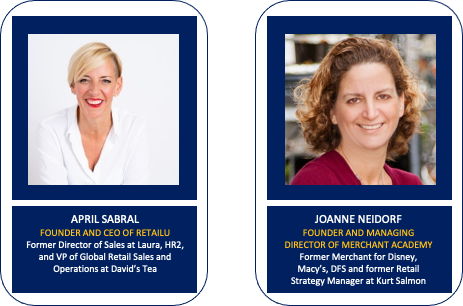Welcome to The Merchant Life, for retailers and retail enthusiasts wanting the insider perspective of all things retail.
Now let’s talk shop.
In this week’s newsletter we talk to various retail educators on how educating merchants, planners, and retail leaders has evolved.
Outlets including Business Insider have reported that many companies are eliminating the need for a 4 year degree. Leaders from Google, Tesla, and Apple say that having a degree doesn’t prepare you for your career.
As a former merchant, I graduated from Ryerson’s School of Fashion where 80% of the students wanted to be a buyer. We networked and had to complete 400 hours of work study (interning) to get some insight into working in retail.
I learned everything about garment construction, marketing, retail math, and textiles in my 4 year program but no buying courses in sight.
Like many merchants, I learned on the job.
If most retailers are learning on the job, why have a focus on education?
Let’s find out.
Retail Education
We talked to our peers in retail education on the disruption of retail, how they adapt their curriculums to shifts in industry, and how they prepare next gen retailers and executives.
We spoke to Scott Benedict, a former merchant leader and now an Executive Professor & Director at Texas A&M’s Center for Retailing Studies and Dr. Janice Rudkowski, Assistant Professor at Ryerson’s School of Retail Management.
Q: As the importance of a degree is slowly being dispelled and higher education is being disrupted, what is the value proposition of a degree in retail business today?
Scott: We are really focused on preparing leaders of retail and as retail becomes more complex, the need for educated retail leaders is more important than ever today because many of the roles today are taking on a number of different paths and journeys.
Janice: A degree in retail business is valuable now more than ever as retailers, manufacturers and service providers look for uniquely equipped talent to navigate and tackle the dynamic and always changing retail landscape together.
Outside of the fundamentals, are retail educators teaching the most relevant skills to their students?
Furthermore, how do they know what they are teaching is being used?
Scott: We add new courses and new content all the time. As a former merchant, I am wired to ‘comp shopping’ and reviewing the best practices of other programs and retailers. It’s an ongoing effort just like monitoring the competition, we can respond to shifts and trends in the industry.
Janice: Even before the pandemic, our curriculum was always adapting and evolving. This is the nature of retail – it’s always changing. I’m always updating my courses with new industry examples, information, resources and material to keep it relevant, fresh, experiential and engaging.
Change is inevitable.
Especially in retail.
Retailers have to make adjustments in how they work, how they create product, and how they sell to the customer.
The same thing goes for retail educators.
Infusing digital product creation and predictive analytics in a curriculum could give students the leverage that retail leaders need to increase adoption of new ways of working.
My VP learned on the job, my Director learned on the job and from her DMM, I learned from my Director and so on.
But if my assistant buyer told me there was a way I could save hours of time and predict what the customer wanted and how they wanted to shop?
Well…
Skill Up.
If retail is continuously evolving, how do retailers keep up?
According to Forbes, “Retailers need continuous training and development programs to make sure employees deliver on these fast-changing promises aligned to the corporate vision.”
In addition to the training needed to use new digital tools and the increased use of data, upskilling is a no brainer.
“Upskilling is a must-have as omni-channel retail undergoes the next digital transformation to what some experts call multi-experience. Accelerated by the pandemic, retail digitalization meets customer demands in new ways.
As retailers take a holistic view of operations, from sourcing through fulfillment, they also need to factor in the EX across each step, making sure workers have the technologies and support they need to meet customer demands.”
We talked to April Sabral, the founder of retailu, and Joanne Neidrof from Merchant Academy on training retail leaders who are in existing roles.
Q: What does upskilling of retailers look like today?
April: It means the same it always has to me, it means empowering them to make decisions, building leadership skills to fuel our future managers and continue to build bench strength for your team. Not only selling and product knowledge. The companies who invest in their people will win in the long run.
Joanne: Teaching merchants to think differently and utilize data and technology to allow them to be better merchants. Once merchants understand what that data can tell them, they can better understand what to ask from the data.
WSJ wrote that there were 342,000 more retail jobs openings and that retailers like Levi’s, Walmart, Macy’s and Target are looking for workers to fill positions in a revamped labour market.
In a nutshell, the open roles require a lot more skills vs. the workers that were furloughed. They lack skills in AI and machine learning that are necessary in retail today, especially as the business becomes more digitized.
“Levi’s is confronting a problem faced by companies in a range of industries from finance to retail to technology. Many of their workers lack the necessary skills to address modern business challenges.
For retailing, artificial intelligence and machine learning are playing an outsize role as more shopping shifts online.”
It’s not just digital skills that might be scarce, with the advent of livestreaming and the concept of front line staff being brand ambassadors, other skills maybe in short supply.
April adds:
“Presentation skills and public speaking on camera is now part of your job as well as knowing how to operate the tech piece of it.”
Both Scott and Janice endorse upskilling as a way for retailers to stay competitive and win. To think that nothing will change is a common theme with failed retailers – hence, constant learning is essential for success.
With the need to upskill becoming more urgent as retail begins to open up again, it begs the question – are retailers capable of doing this retraining on their own?
April: They can create it themselves but why would they want to? It could cost them up to 3 people and a year to build, when they can trust us after leading high performing teams for over 25 years. We are saving time and money and helping them drive better results. I think they have enough to manage with the new reality of operating in a post pandemic.
Joanne: There are very few retailers that have an in house training program outside of a handful of retailers. Retailers relied on bringing in merchants coming from Macy’s and Target to train their merchant teams but the jobs are getting so big and so complex that external talent just doesn’t have the time.
Janice adds that retailers are aware of this and proactively seek the necessary help:
Retail organizations come to us with specific needs for different employees within their organizations – and they want specialized training programs in areas for example merchandising and space planning management.
Clearly, the educational process does not stop with either a formal degree or a singular training program.
The learning must be consistent, continuous and be flexible in response to change.
Role Play
The acceleration of retail technology in the last 12 months not only eliminated retailers that couldn’t hack it or were living in the dark ages, it also brought us new roles that got us excited about retail.
According to Accenture’s Reimagining the Retail Workforce white paper:
“Retailers will need to evaluate and prepare their existing talent as these new roles emerge. While maintaining expertise in a single function, each employee will need to develop cross functional skills as well. Digital literacy, data and analytics, and end-to-end consumer experiences must take priority…”
We asked our educators their thoughts on future retail roles; each had a unique point of view given their diverse backgrounds.
Scott: The teams within the traditional legacy retailer ran physical and digital separately. More retailers are integrating the physical and digital. Future leaders in retail need to understand both and how they intersect to serve the customer.
Janice: There are new roles that have emerged both on the front lines such as personal shopper or online sales associate and in the head office such as customer experience designers and omni-channel specialists. Inventory management is also of utmost importance – therefore, retailers are creating new roles in these operational areas.
April: I can see more roles around wellness coaching and multi-site leaders taking on more around ecom and marketing. Roles will always expand but core skills like managing people will always be required and these don’t really change.
Joanne: I’ve seen everything from sticking to the traditional buyer/planner structure to building support teams outside the core team. For example, online merchandising teams separate from the physical store merchandising team.
If we needed more evidence to showcase the fresh roles that are being cooked up by companies, consider that Hasbro posted a job not too long ago for their Nerf brand seeking out a Chief TikTok Officer.
In a Forbes article, Nerf’s Senior Director of Brand Strategy says:
“While the Nerf global marketing team really is best-in-class at what they do in terms of creativity and connecting with our fans, we admit we can use some help as the brand steps into the world of TikTok. We’re ready to hand over the social reins to one talented creator to run the Nerf TikTok account.”
Mind you, the job would last for 3 months with compensation pegged at $10K monthly.
What’s encouraging here is that a brand is actively aware that they need help, recognize they don’t have the knowledge internally and go seek that expertise.
That’s just as exciting as a spontaneous Nerf gun war.
The Big Finish
Degrees can be useful – the catch is that the educational program must adjust to the needs of the industry. Just as much as retailers must respond quickly to change, educators must move in lockstep with them.
Will universities incorporate TikTok video making in their retail programs?
Doubt it.
Will they discuss the expanded scope of marketing within the industry to include social media, livestreaming and influencer campaigns?
Yes, this would be valuable to learn.
Will they also continue to hire industry veterans to come in to guest lecture and hold teaching positions?
Absolutely.
At one point, the idea of “learning on the job” was touted as a badge of honour. The reality is that on the job learning trumps being book smart. There are certain things you just cannot teach from a book and must be experienced directly.
Since the pace of change within retail is only picking up speed, the notion of training on the job without a proper educational foundation and support may actually impede progress.
Adjust ‘your assortment’ and evolve your skillsets.
This will make your retailing relevant.








